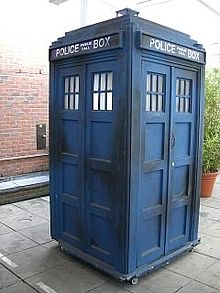The Doctor (Doctor Who)
![]()
This article is still missing the following important information:
Reception
Help Wikipedia by researching and adding them.
Doctor Who (after the titular question, "Doctor who?") is a British science fiction television series produced by the BBC since 1963. Doctor Who is about a mysterious time traveler known only as "The Doctor". He travels with his companions in the time-space machine TARDIS (Time And Relative Dimensions In Space), which is disguised as an old police emergency cell, and gets involved in various adventures along the way. The series aired continuously from 1963 to 1989; there was a TV movie in 1996; since 2005, the series has continued in a remake with new technical capabilities. The first Doctor (1963-1966) was portrayed by William Hartnell, followed by Patrick Troughton, Jon Pertwee, Tom Baker, Peter Davison, Colin Baker, Sylvester McCoy, Paul McGann, Christopher Eccleston, David Tennant, Matt Smith, John Hurt and Peter Capaldi. Currently (since 2017), Jodie Whittaker plays the Thirteenth Doctor, who is the first female incarnation of the character. In addition, Jo Martin has been portraying another incarnation of the Doctor since 2020, though her position in the regeneration order is currently unclear.
Doctor Who has an entry in the Guinness Book of Records as the longest-running and most successful science fiction television series to date. The series is an important part of British pop culture, is considered a cult television series particularly in the UK (and increasingly in the rest of Europe, North and South America, and Oceania and parts of East Asia), and has influenced generations of British television producers, writers and actors who grew up with Doctor Who. Fans of the series and the fictional universe (Whoniverse) based on it are known as Whovians. The series has won awards from both critics and viewers, including the BAFTA award for Best Drama Series in 2006, and has won the National Television Award in the Drama category five consecutive times since 2005. It won the German Curt Siodmak Award for Best Science Fiction Series four times in a row from 2014 to 2017, and was inducted into the Science Fiction and Fantasy Hall of Fame in 2019.
Storyline
Main character "The Doctor"
The Doctor is the central character in Doctor Who. Since the term is used less as an academic degree than as a proper noun, the spelling Der Doctor is also sometimes used in German in this context.
The Doctor is surrounded by many secrets from the beginning. You rarely learn personal things about him. He owns a time-space machine called the TARDIS, which is much larger on the inside and has the external appearance of an old-fashioned English police emergency cell. TARDIS is short for "Time And Relative Dimension(s) In Space", making it clear that these machines can travel in both time and space - over the course of the series, the Doctor even travelled to parallel universes. In the German dub, TARDIS sometimes becomes (for example in the 1996 TV movie) a backronym for "Trips due to relative dimensions in the Starzelt". Each TARDIS has a cloaking device, but the Doctor's doesn't work because the "Chameleon Circuit" of his TARDIS is defective.
The Doctor himself belongs to a species whose time travelers call themselves Timelords and come from the planet Gallifrey. In his eighth incarnation, he once claimed that he himself was only half a Timelord, descended from a human on his mother's side. He nevertheless grew up on the Timelords' home planet, Gallifrey.
The Doctor's real name remains his greatest secret to this day. He always introduces himself as "The Doctor," which is often followed by the question that gives the series its title: "Doctor who?" (English for 'Doctor who?'). When he can't avoid going by a common name, he usually goes by John Smith - a name that is the combination of the most common (male) first and last name in English.
With regard to the question of whether or in what field he has a doctorate at all, there are various statements in the course of the series. For example, he initially declared that he was not a doctor of medicine, but later states that he studied under the well-known surgeons Joseph Lister and Joseph Bell, and finally specifies that he studied for a medical degree in Glasgow in the 19th century. It is also mentioned several times that he was a doctor of many scientific disciplines (English a doctor of many things).
Like all Timelords, he has the ability to "regenerate" when mortally wounded. The process itself is usually extremely unpleasant for the Doctor, and often involves temporary disruptions such as memory loss or confusion. In addition, his appearance and character change, sometimes seriously, in the process. For example, depending on the regeneration, the Doctor may take on a more serious, darker, or humorous disposition. A change of gender is also possible.
Regularly, a Timelord can go through this process twelve times and thus have a total of thirteen incarnations. Since the Eleventh Doctor was already the thirteenth incarnation, deviating from the numbering, the Doctor's existence should have ended after him. However, from a rift in the universe, apparently a connection to the Timelords, he was granted a new cycle, allowing him another twelve regenerations.
The process of regeneration allowed the series to remain fresh for over 50 years without any noticeable fundamental changes in concept. These ever-changing Doctors were not planned from the start, but were introduced out of necessity as the first Doctor, William Hartnell, struggled with health problems.
Companions of the Doctor (Companions)
→ Main article: Races, groupings and individuals in the Doctor Who universe#Companions of the Doctor.
In order not to be too lonely, the Doctor usually travels with selected companions. The first companion was his 15-year-old granddaughter Susan Foreman. Later, they are different people who usually meet the Doctor by chance, go through an adventure with him and then join his travels. Over the years, these were mainly people from Earth, but also the robot dog K-9 or travelers from distant planets.
Current companions
Graham O'Brien (Bradley Walsh) first appears in episode 11.01, where he meets the newly regenerated Thirteenth Doctor. He was a bus driver in Sheffield (he retired due to cancer), where he lives with his wife Grace and their grandson Ryan Sinclair. His relationship with Ryan is strained as he won't accept him as his grandfather, which definitely puts a strain on Graham. After his wife dies fighting the alien manhunter Tim Shaw, he joins Ryan and his old school friend Yasmin Khan in their travels with the Doctor.
Ryan Sinclair (Tosin Cole) makes his first appearance in episode 11.01. Ryan lives in Sheffield with his grandmother Grace and her husband Graham O'Brien. He suffers from dyspraxia, which means he still has trouble riding a bike at a later age. When Graham tries to teach him, he discovers an alien pod in the woods, which leads him, his grandparents and his old school friend Yasmin Khan into contact with the newly regenerated Thirteenth Doctor and an alien human hunter named Tim Shaw. After his grandmother dies fighting Shaw, he, as well as Graham and Yasmin join the Doctor's travels.
Yasmin "Yaz" Khan (Mandip Gill) made her first appearance in episode 11.01. She works for the Sheffield Police and meets her old school friend Ryan Sinclair again after a long time when he discovers an alien pod. This belongs to an alien human hunter named Tim Shaw. Through this event, she meets the newly regenerated Thirteenth Doctor, whose travels she joins after Ryan's grandmother Grace is killed fighting Shaw. On one trip, she meets her grandmother as a young woman the day before her wedding.
Other important peoples, groups and individuals
For other major races, groupings and individual beings in Doctor Who, see: Races, groupings and individuals in the Doctor Who universe.

Mandip Gill, portrayer of Yasmin Khan (2018).

The TARDIS

Bradley Walsh, performer of Graham O'Brien (2012).

Jodie Whittaker, the current 13th Doctor as of December 2017 (2018).
Publication
Episode list
→ Main article: Doctor Who/episode list
German publications
→ Main article: Doctor Who/German releases
At the cinema
- Dr. Who and the Daleks (1965)
- Daleks - Invasion Earth 2150 AD (1966)
- The Day of the Doctor (Doctor Who 50th Anniversary Special) (2013)
- Deep Breath (2014)
- Dark Water / Death in Heaven (2015)
- The Husbands of River Song (2016)
- Twice Upon A Time (2017)
The first two films essentially depict stories that were already on television, only shot with a greater effort and in color. The films starred Peter Cushing, and the Doctor introduces himself as Doctor Who. In the film, he appears to be a human scientist who invented his own time machine.
The Day of the Doctor is about the great war between the Daleks and the Timelords. It was shown in 3D in over 70 countries on 23 November 2013.
On August 23, 2014, the first episode of the eighth season Deep Breath aired simultaneously in select theaters worldwide. It is the first episode featuring the Twelfth Doctor, embodied by Peter Capaldi.
On September 15 and 16, 2015, the two-part finale of the eighth season was shown in selected cinemas worldwide before the start of the ninth season. The episodes Dark Water and Death in Heaven were shown in a 3D version, which was later also released on Blu-ray 3D. In cinemas, the original was shown, and with or without translated subtitles depending on the country. In the UK and German-speaking countries, the theatrical release was not shown.
On January 28, 2016, the 2015 Christmas special featuring River Song aired in select theaters.
To usher in the end of Capaldi's era as the 12th Doctor, the 2017 Christmas special Twice Upon A Time was released in German cinemas on 25 December 2017.
Questions and Answers
Q: Who is the central character in Doctor Who?
A: The Doctor is the central character in Doctor Who.
Q: What is the Doctor's origin?
A: The Doctor is an alien, a Time Lord from the planet Gallifrey.
Q: What is the Doctor's mode of transportation?
A: The Doctor travels in his space-time-ship, the TARDIS (Time And Relative Dimensions In Space), which can go anywhere in time and space.
Q: Why does the TARDIS look like an old British police-call box?
A: The TARDIS's chameleon circuit is broken, so it looks like an old British police-call box permanently.
Q: What are the Doctor's companions usually called?
A: The Doctor's companions are usually called "companions" or "assistants".
Q: Who are the Doctor's most recent companions?
A: The Doctor's most recent companions are Yaz and Dan.
Q: What kind of people are the Doctor's companions in the modern series?
A: The Doctor's companions in the modern series are always 21st century humans, although the classic series often had human-looking aliens or people from the past or future.
Search within the encyclopedia